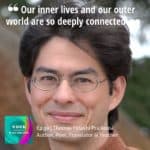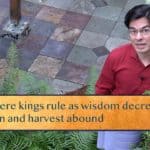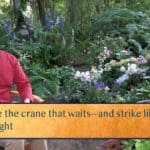I was delighted to discuss compassion, poetry, the Tirukkural, leadership, voice, silence, and much more with the wonderful Chloë Goodchild on her VOCE Dialogues Podcast. You can listen to the […]
Tirukkural Verses, Interviews, and Reviews
From and about The Kural: Tiruvalluvar's Tirukkural.
Kural 545: The Kural on Leadership and Abundance
A verse on good governance and the abundance of the earth. From chapter 55, “Good Rule.” Translated from the Tamil by Thomas Hitoshi PruiksmaTHE KURAL: Tiruvalluvar’s TirukkuralBeacon Press, Boston
Kural 401: Tiruvalluvar on Knowledge and Leadership
A verse on what we need to address the wise. From chapter 41, “Lack of Learning.” Translated from the Tamil by Thomas Hitoshi PruiksmaTHE KURAL: Tiruvalluvar’s TirukkuralBeacon Press, Boston
Kural 490: Tiruvalluvar on Patience
A verse on waiting for the right moment, along with a verse from Avvaiyar. From chapter 49, “Knowing Time.” Translated from the Tamil by Thomas Hitoshi PruiksmaTHE KURAL: Tiruvalluvar’s TirukkuralBeacon […]
Kural 787: Tiruvalluvar on Friendship
A verse on how friends stay with you through hard times, along with a verse from Avvaiyar. From chapter 79, “Friendship.” Translated from the Tamil by Thomas Hitoshi PruiksmaTHE KURAL: […]




